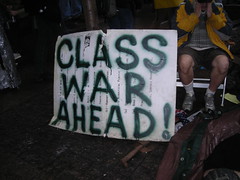It’s hard to put a finger on the “Occupy Wall Street” movement that has been increasing in numbers and attention over the past month. I’ve been asked many times my thoughts on the group, and my general response is a simple shrug of the shoulders; how does one put a label on such a diverse, unorganized, self-contradicting band of protestors?
From what I can tell, the broad movement is comprised of varying “factions” of ideologically opposed individuals. That means it won’t last long without purging the minority and ultimately coalescing around a specific set of principles, ideas, or demands. It appears that the end result is moving towards a class warfare-based revolt against the wealthy—hardly an inspiring, principled, or moral stand against injustice.
While the group yet lacks cohesiveness, it is perfecting its propaganda in order to create a unified identity. Shortly after the protests began, a campaign was launched and a slogan created: “We are the 99%!” The campaign’s central website, with posts from a few hundred individuals, describes the meaning behind the slogan as follows:
We are the 99 percent. We are getting kicked out of our homes. We are forced to choose between groceries and rent. We are denied quality medical care. We are suffering from environmental pollution. We are working long hours for little pay and no rights, if we’re working at all. We are getting nothing while the other 1 percent is getting everything. We are the 99 percent.
It is both arrogant and absurd for this group to speak for the masses. Besides, the main focal point of their rallying cry—"we are the 99%" fighting against the 1%—is completely fictional. The Atlantic‘s Daniel Indiviglio explains:
- Foreclosure activity may affect somewhere in the ballpark of 10% of U.S. households. That’s a tragically high percentage, to be sure. But it’s no where near 99%.
- 15% of Americans live below the poverty line. That’s clearly far too high a percentage, but again, it’s a small minority.
- Before last year’s Affordable Care Act, about 30 million Americans were uninsured, which is roughly 10% of the population. Of course, with the new law in place that number should approach zero.
- I have no idea how to quantify how many people are suffering from environmental pollution, but I strongly suspect if you got 100 people in a room and asked them, 99 would not say pollution is a huge problem in their lives.
- Wage growth certainly has been weaker than would be ideal, but 87.5% of Americans are satisfied with their jobs, according to Gallup. The underemployment rate is 16.2%.
The collectivist mentality manifested in such an absurd assertion—that these disgruntled few who have made poor choices or find themselves in challenging circumstances not of their own making somehow represent over 300 million Americans—is hardly exclusive to the Occupy Wall Street movement. It is likewise a tactic employed by the supposed 1% themselves, especially evident when politicians claim to know and represent what a diverse body of individuals want, and speak on their behalf.
It was George Orwell who correctly concluded that “collectivism is not inherently democratic, but, on the contrary, gives to a tyrannical minority such powers as the Spanish Inquisitors never dreamt of.” That so many among the Occupy Wall Street masses demand that the wealth of the financial elite be forcefully confiscated and given to the poor “99%” is the only evidence needed to demonstrate the accuracy and fulfillment of Orwell’s words.
I am not part of the 99%, and I reject their attempt to speak on my behalf. I am an individual. I speak, think, and act for myself. Though they might claim to do so, nobody else represents me.
I make decisions based on available options, and where those options are limited or undesirable, I work to change them—either through persuasion or, if the situation merits it, direct (but moral) opposition. I do not shift the blame for my mistakes or unfortunate circumstances to others; I understand the law of the harvest and accept the consequences of my own actions. I respect the agency of others, and though they may use that agency to cause me harm, I do not vindictively seek vengeance.
Though I am regulated, legislation, and mandated against at every turn by a police state on one hand and a nanny state on the other, I refuse to be a victim. When I am told that I cannot fly without being molested or irradiated, I drive. When the government wants to steal my 401k and erode the value of my hard-earned wealth through an inflation tax, I abandon the dollar. When large companies collude with government to profit at my expense, I deny them my voluntary commerce. Where such institutions are given my confiscated earnings through coercive taxation, I work to politically punish those responsible and alert others to the theft.
I envy no man’s wealth—especially when accumulated through immoral means. Despite having made their millions through the aid of lobbyists, political favors, and bailouts, I do not consider the tainted money of bankers and Wall Street fat cats worth stealing back. Asking the institution which stole it in the first place to then steal it once more hardly seems like a good idea.
I, too, protest income disparity, economic injustice, and crapitalism. I do so through moral means such as persuasion, education, and the free market. I make no demands of the government other than those which would allow myself and others to fully and peacefully enjoy our lives, liberty, and property.
I am not a statistic, lumped together into a faceless aggregate by those who arrogantly wish to speak on my behalf. I am not the 99%. I am just one individual who acknowledges that nobody—whether the 99% or the 1%—represents me.
***************
Related Posts (automatically generated)
Continue reading at the original source →




